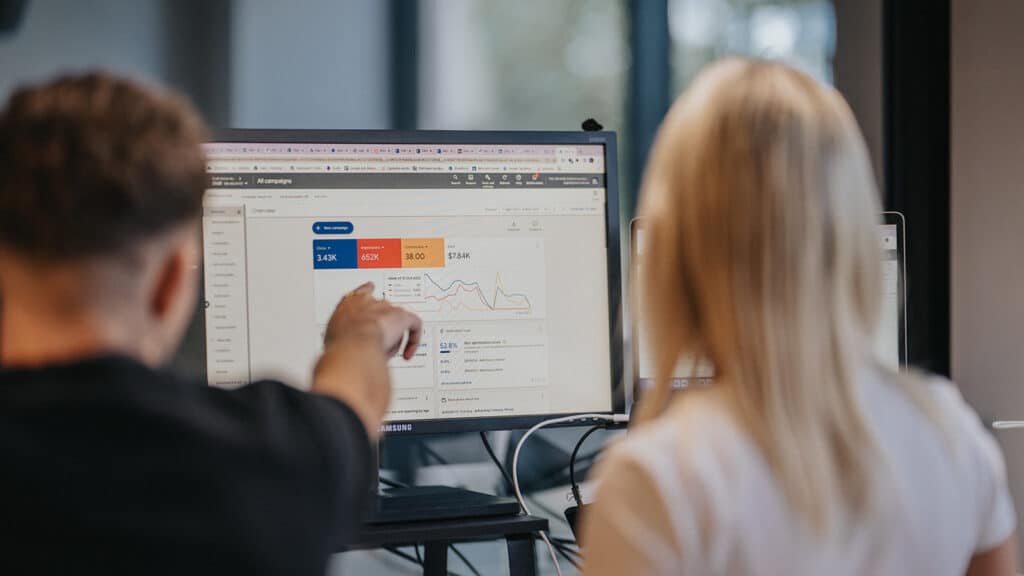How do you set a budget for my Google Ads campaign?
Our PPC specialists determine a suitable budget for your Google Ads campaign by considering your goals, keyword competitiveness, target audience, geographical scope, ad positioning, competition, estimated click costs, and historical conversion rates. We calculate a daily and monthly budget based on these factors to align with your objectives. As the campaign progresses, adjustments are made for optimal performance and return on investment.
What are keywords and why are they important in Google Ads?
Keywords are the terms or phrases that trigger your ads to appear when users search on Google. They’re crucial because they determine when and where your ads will show, connecting your ads with relevant user queries.
How do you write effective Google Ads?
Effective Google Ads are concise, relevant, and include compelling headlines and descriptions that encourage users to take action. They should also include relevant keywords and a strong call-to-action.
I have a Google Ads credit, can you use this?
Google occasionally offers ad credits as part of promotions. You usually need to meet specific criteria to claim these credits, and the process can vary. We will check your Google Ads account for any available credits and use these where and when we can!
What kind of budget should I set aside for Google Ads?
The budget you should set aside for Google Ads depends on various factors such as your industry, goals, and competition. It’s recommended to start with a budget you’re comfortable with and adjust based on performance. Our PPC specialists can help you determine the best budget for your campaign!
How do you track the performance of my Google Ads campaigns?
We track your Google Ads campaign performance through various methods. We use the Google Ads platform to monitor key metrics such as clicks, impressions, click-through rate (CTR), conversions, and cost per conversion. We also ensure conversion tracking is set up to measure specific actions, like purchases or form submissions. Additionally, we integrate Google Analytics to gain deeper insights into user behaviour from PPC traffic on your website.
What does it mean by “optimising” my Google Ads campaigns?
Optimisation involves refining your campaigns over time. This includes adjusting keywords, ad copy, bids, and targeting based on performance data to improve ad relevance and efficiency. Regular analysis of metrics such as clicks, impressions, click-through rate (CTR), conversions, ROAS and cost per conversion help guide us in optimising the campaign by adjusting keywords, ad copy, and bidding strategies to enhance overall effectiveness and ROI.
What are some common Google Ads mistakes?
Some of the common Google Ads mistakes that can lead to poor campaign performance include selecting irrelevant keywords, neglecting negative keywords, weak ad copy, not utilising ad extensions, ignoring Quality Score factors, infrequent campaign monitoring, inadequate landing page design, improper geo-targeting, lacking conversion tracking, making excessive setting changes. Avoiding these mistakes requires strategic keyword selection, which may include regular monitoring, A/B testing proper geo-targeting, responsive mobile design, and attention to Quality Score and conversion tracking.
What are the benefits of using Google Ads?
Google Ads allows you to target a highly relevant audience, control your budget, track performance, and quickly reach potential customers actively searching for products or services like yours.
What are the drawbacks of using Google Ads?
Potential high competition leading to increased costs. Highly competitive industries can drive up Cost Per Click (CPC) and make it challenging to maintain a prominent ad position within your budget. Users using ad blockers can sometimes limit the reach of your ads. Google ads has immediate results, so naturally if you stop running ads, your visibility and traffic will likely decrease.
Despite these drawbacks, effective management and optimisation can mitigate many of these challenges, making Google Ads a powerful tool for online advertising.
What types of businesses can benefit from Google Ads?
Virtually any business can benefit from Google Ads, but it’s particularly effective for businesses with specific products or services, local businesses, e-commerce, and those looking for immediate online visibility.
How does Google Ads compare to other advertising platforms?
Unlike social media platforms that target users based on interests and behaviours, Google Ads targets users based on these, in addition to a user’s search queries, capturing users actively looking for products or services.
Google Ads offers various ad formats, including text ads, display ads, video ads, and shopping ads, providing options for different business goals. Depending on the industry, competition, and keywords, Google Ads can have higher costs per click compared to some social media platforms.
Google Ads offers immediate visibility, while some other platforms may require time to build an audience and gain traction. Choosing the right platform depends on your goals, target audience, and advertising strategy. Our team at Distl can help determine the best strategy for your business objectives!
What are some best practices for using Google Ads?
Best practices include choosing relevant keywords, writing compelling ad copy, testing different ad variations, targeting specific demographics, and using ad extensions to provide additional information.
Can you target my Google Ads campaigns to specific geographical areas or demographics?
Yes, we can target your campaigns based on geographical locations, such as cities, states and countries, even down to postcodes and kilometre radius targeting! We can also target demographics (such as age, gender, income), and even specific interests.
How can I use Google Ads to improve my brand awareness?
You can use Google Ads to display your ads across relevant websites in the Display Network or run YouTube video ads to reach a broader audience and enhance brand visibility.
Can you use Google Ads to drive traffic to my physical location?
Yes, with location targeting and Google My Business integration, you can drive traffic to your physical store by showing ads to users near your location when they search for relevant keywords. There are few requirements, but our specialists can help determine whether you are eligible!
Can you use Google Ads to reach a global audience?
Absolutely, Google Ads allows you to target specific countries, regions, or even languages to reach a global audience.
What are some resources for learning more about Google Ads?
Aside from asking our very own Google ads wizards at Distl, Google’s own resources, such as the Google Ads Help Center and Academy for Ads, are great places to start. There are also various online courses and blogs that provide in-depth insights.
What are some communities?
Communities like the Google Ads Community Forum and industry-specific forums are excellent places to connect with other advertisers, ask questions, and learn from each other.
What’s the difference between Search and Display ads?
Search ads appear on Google’s search results page when users search for specific keywords, while Display ads are visual ads shown on websites within Google’s Display Network, targeting users based on their interests and behaviour.
What happens if you stop my Google Ads campaigns?
If you stop your campaigns, your ads will no longer appear, and you’ll no longer incur ad costs. That can be a benefit for businesses who need to run ads in short bursts, for example during a seasonal promotion. However, you’ll also lose the potential traffic and conversions that the campaigns were generating.
Are Google Ads worth it for small businesses?
Yes, Google Ads can be beneficial for small businesses as it allows precise targeting, budget control, and the ability to compete with larger businesses in search results.
Are Google Ads cheaper than Facebook?
The cost of ads on Google and Facebook can vary based on factors like industry, competition, and targeting. Both platforms offer different benefits, and costs can vary widely. Our specialists can help determine costs tailored specifically to your own business.
How do Google Ads charge you?
Google Ads charges you through a pay-per-click (PPC) model, meaning you’re charged each time someone clicks on your ad. The cost per click (CPC) depends on factors like competition and bid amount. Most commonly, Google aggregates the costs from clicks throughout the billing cycle (usually a month) and sends you an invoice or charges your pre-set payment method in the account. You’ll make payments based on the accumulated costs, and your ads continue running as long as your budget allows.










